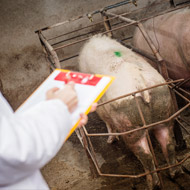Inspectors to introduce tougher inspection regime for tail docking

Routine tail docking is not permitted by law.
A tougher inspection regime for tail docking and enrichment in pigs is set to be introduced after several producers were found to have fallen foul of APHA’s enhanced enforcement activity.
According to the National Pig Association (NPA), Defra and the APHA will be clamping down on tail docking ‘in a big way’. The move is reported to have originated from the European Commission, which is putting pressure on all member states to enforce tail docking and enrichment legislation.
In an article for Pig World, NPA said that each member state was required to submit an action plan at the start of 2018. In the UK plan, Defra and the APHA made several commitments, including the increased inspection of pig farms.
The plan also included new guidance and training of APHA assessors and better recording of tail biting and docking in abattoirs by the Food Standards Agency.
Commenting on the inspections, a Defra spokesperson said: “Routine tail docking is not permitted by law. Pig farmers need to demonstrate at inspections that tail docking has been used as a last resort after taking the necessary steps, as described in the current welfare code, to reduce the risks of tail biting.
“This includes actions to improve the pigs’ environment and their management. We want full compliance.”
Producers that have already fallen foul of APHA’s enhanced enforcement activity have received deductions to their Basic Payment and/or served enforcement notices. NPA chief executive Zoe Davis said the penalties were being imposed where tails were being routinely docked and farmers had not taken steps to prevent tail biting - such as improving the pigs’ environment.
“We are keen to ensure that producers are not unfairly penalised. We are seeking more clarity in a number of areas and are feeding into the discussion on the new Welfare Code to ensure it provides this,” she said.
“We are also trying to get across the complexity of dealing with tailing biting outbreaks. It is a multifactorial problem and can be unpredictable. Pig producers in all systems experience tail biting to varying degrees and once an outbreak has started it can be very difficult to stop.
“Experience has shown that in some situations, there will be a need to dock tails to prevent a worse situation. At the same time, we are trying to avoid situations where farmers feel compelled to stop tail docking without veterinary supervision or taking steps to avoid tail biting – and end up creating worse problems.”



 The latest
The latest